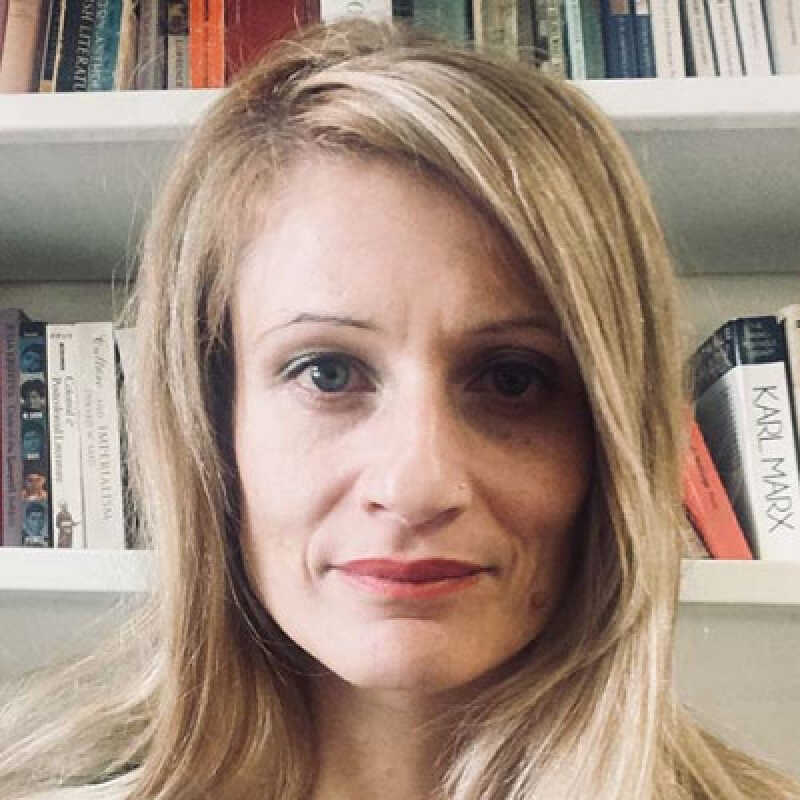- University of Kent
- English at Kent
- People
- Dr Maria Ridda
Dr Maria Ridda


Dr Maria Ridda has been teaching at Kent since 2007. She has also taught at Christ Church University, Canterbury and Birkbeck College, University of London. Her PhD was from the University of Kent and her MA and BA from Università degli Studi di Napoli Federico II.
Maria's research areas are postcolonial theory, South Asian writing and Mediterranean studies. Her current research uses the discourse on crime to investigate the crisis of Western modernity and the nature of inequality in the Global North and South.
Maria's first monograph, Imagining Bombay, London, New York and Beyond (Peter Lang, 2015), examines the literary representations of Bombay, London and New York in contemporary South Asian diasporic texts and films from the 1990s to the present. One reviewer described Imagining Bombay, London and New York as a study that ‘challenges prevailing trends in contemporary literary theory [by addressing] the implications of globalisation on diasporic writing’.
Her second monograph, Criminality and Power in the Postcolonial City: Mapping the Mean Streets of Mumbai and Naples (Routledge, 2022), investigates the literary imaginings of the postcolonial city through the lens of crime in texts set in Naples and Mumbai from the 1990s to the present. In this book, crime provides a means to understand the relationship between space and society/culture in a number of cities across the Global South, by tracing a narrative of postcolonial urbanity that exposes the connections between exploitation and the ongoing ‘coloniality of power’. According to Professor Johnson (Open University), ‘[the book] deftly combines literary analysis, historical contextualisation, and urban theory to open up exciting new avenues for Postcolonial Studies.’ As Professor Nasta (Queen Mary, University of London), Founding Editor of Wasafiri, puts it, '[t]his book offers a fascinating and illuminating comparison of Naples and Mumbai. In its readings of postcolonial texts ‘through criminal eyes’, this study encourages an important rethinking of the relationship between crime, postcolonialism and the urban environment.’
At the moment Maria is working on a collaborative project examining contemporary acts of decolonisation in the UK and in Italy, with a particular focus on how fascist and right-wing ideologies are subverted in public space.
Maria convenes the core MA module ‘Colonial and Postcolonial Discourses’, and the undergraduate modules ‘Postcolonial Writing’, and ‘Empire, New Nations and Migration’.
Maria is happy to discuss supervision on the following topics:
Maria began by researching the postcolonial city in South Asian diasporic writing. Her exploration of inequality, globalisation and neocolonialism led her to question and challenge some of the conceptual boundaries between colonial and postcolonial, North and South, normativity and illegality. In her latest monograph, she interrogates these theoretical bifurcations by extending the investigation of canonical postcolonial topographies to the Mediterranean and, in particular, to her own city of origin, Naples.
Maria is the founder of the ‘Postcolonial Europe Group’, a network that includes scholars, activists and artists from the UK, the Netherlands, Italy, Belgium and Malta. The ‘Postcolonial Europe Group’ held its inaugural symposium at the University of Kent in 2019.
She is also the co-convener of the seminar series hosted by the Centre for the Global Study of Empire @CentreEmpire.
Loading publications...
Showing of total publications in the Kent Academic Repository. View all publications